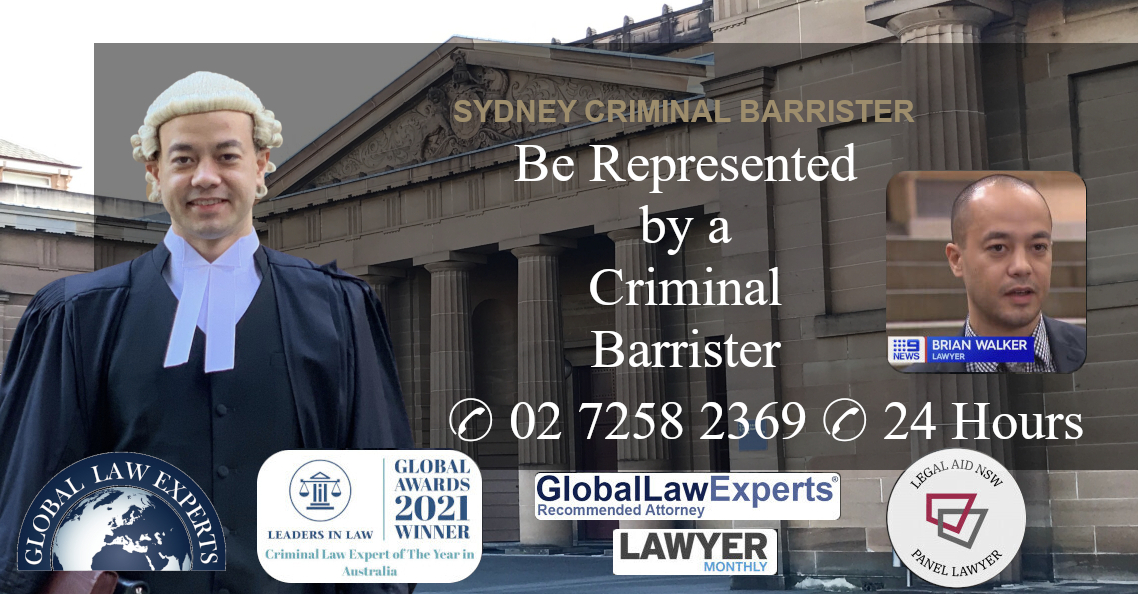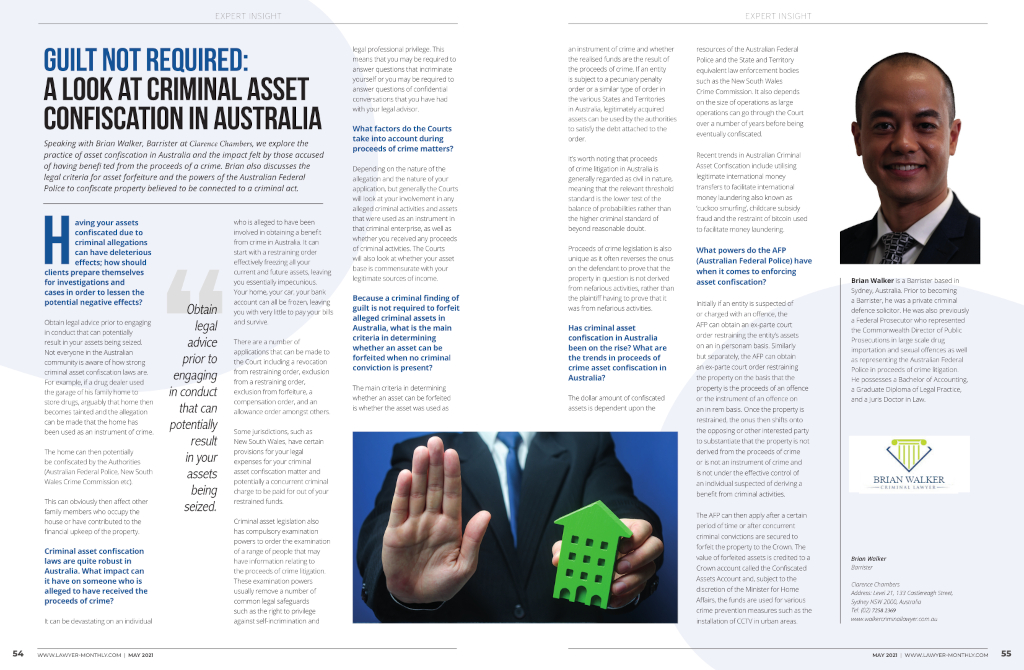

SYDNEY CRIMINAL LAWYER
Obtain the most qualified legal representation
In order to minimise the disruption to your freedom, your financial position, your future career and travel prospects, be represented by a Sydney Criminal Barrister whom was a former Federal Prosecutor and AFP Member to ensure that you get the best result.
SPECIALISING IN
SYDNEY CRIMINAL LAWYER
Recent Results
My client was charged with an assault arising out of a domestic incident as well as an apprehended domestic violence order (AVO).
Initially my client was going to plead guilty, but after reviewing the allegation, a legal admissibility issue arose with evidence in the prosecution case. Based on this, my client was advised to plead not guilty which they followed.
At the hearing, due to evidence admissibility issues, both the criminal charge and AVO were dismissed.
This was a great result for my client whom is able to maintain their prior good character without the police charge and AVO effecting any of their future endeavours.
View this post on Instagram
My client was charged with assault arising out of an incident at The Star Casino in Sydney.
After initially pleading not guilty, my client plead guilty following advice.
During sentencing submissions, submissions were provided to the Court on behalf of my client noting their remorse, contrition and rehabilitative efforts after the offence. Submissions were provided as to why it was unlikely that my client would re-offend and why rehabilitating my client should play an important role in determining a suitable sentence.
Ultimately His Honour was satisfied that my client ought to be able to leave the court with their prior good character intact and sentenced my client to a Conditional Release Order without recording a conviction.
This was a great result for my client whose job, career and travel prospects will not be effected by this criminal charge.
My client was arrested and charged with common assault and property damage arising out of a domestic incident.
Following advice, my client plead guilty and his matter was adjourned for sentencing. My client engaged in a rehabilitative program including cognitive behavioural therapy in an effort to address the reasons behind his offending behaviour.
During sentencing proceedings before a learned Magistrate at Penrith Local Court, submissions were made on behalf of my client involving his rehabilitative efforts, his years of service to the community, why his chances of re-offending were low and why his prospects of rehabilitation were high.
Ultimately whilst His Honour acknowledged that domestic violence offences are treated seriously in contemporary Australia, in my client’s case, His Honour was satisfied that a conviction would not be the appropriate sentencing option. As such, my client was sentenced to a Conditional Release Order without conviction.
This was a fantastic result for my client who was able to leave Court with his good name and character still intact!
My client was charged with a number of charges arising out of an incident at a licensed premises. Following negotiations with police, my client agreed to plead guilty to some charges including assault police in the execution their duty and common assault upon other charges being withdrawn.
During sentencing submissions, my client’s personal and subjective circumstances were presented to the court including a number of mitigating factors such as, my client’s age, a lack of criminal antecedents, and my client’s role in the community.
Ultimately whilst assaulting police should never be regarded as an inconsequential offence, in this matter, His Honour was satisfied that a conviction should not be recorded and my client was placed on a Conditional Release Order Without Conviction.
This was a great result for my client who can now continue with their rehabilitative efforts and career aspirations without a criminal record/conviction!
My client was charged with sexual touching without consent contrary to section 61KC Crimes Act 1900 (NSW).
During a defended hearing at the Downing Centre, evidence was adduced regarding the timing of the complaint, ulterior motives for making the sexual touching allegation and inconsistencies in the complainant’s evidence regarding an account of the allegation given to police and an account given to other people.
At the conclusion of the defended hearing, His Honour found my client not guilty. This was a great result for my client who had this charge dismissed!
As part of a drug investigation, my client’s car was stopped and a significant amount of cash was seized by police.
After court proceedings relating to drug supply were concluded, an application was made to the court for the return of the seized cash.
Whilst the main governing legislation in NSW concerning the confiscation of alleged proceeds of crime money is the Confiscation of Proceeds of Crime Act 1989 (NSW), an application was made pursuant to the Law Enforcement (Powers and Responsibilities) Act 2002 (NSW). After evidence was adduced as to the circumstances of the police searching and seizing the alleged proceeds of crime cash, the court granted the application for the return of the cash to my client.
Reliance was placed on historical common law principles of possession deriving from the United Kingdom and cases such as Costello v Derbyshire Constabulary [2001] EWCA Civ 381 and R v D’Eyncourt and Ryan (1888) LR 21 QBD 109.
This was a great result for my client who received the seized cash back despite being found guilty of drug supply.
My client was initially found guilty and convicted at Sutherland Local Court. I represented my client upon a Severity Appeal at the Downing Centre.
During the Severity Appeal, submissions were made to the learned Judge concerning the rehabilitative efforts that my client had made after the offending conduct, as well as the context of circumstances at the time which contributed to the offending behaviour.
The law prescribes a number of factors to be considered during consideration of an appropriate sentence. Submissions were made regarding the discount on sentence for pleading guilty, why my client’s chances of recidivism were low and why his prospects of rehabilitation are high.
Ultimately the submissions provided to His Honour were accepted and despite my client initially receiving a supervised bond with a conviction, His Honour quashed the original order made in the Local Court and enacted a conditional release order without conviction.
This was a great result for my client who was able to leave court without a criminal record, being able to pursue his career and travel prospects.
My client was charged with common assault arising out of a domestic dispute. My client initially plead not guilty. During the day of the contested hearing at Liverpool Local Court, I engaged in discussions with the prosecutor. It was agreed that the criminal charge would be withdrawn.
As such, the matter was withdrawn by the learned prosecutor in court and the criminal charge was marked as dismissed!
This was a great result for my client who was able to leave Liverpool Local Court without a criminal record and/or conviction in relation to an allegation of common assault.
My client was charged with:
- High Range Drink Driving With an Illicit Drug in system,
- 2 x Drive Whilst Disqualified,
- Drive with illicit drug in system.
Following advice, my client plead guilty and was sentenced at Parramatta Local Court. During sentencing submissions, submissions were made to the learned Magistrate concerning my client’s rehabilitative efforts as well as circumstances that had effected his life at around the time of the offending behaviour. Submissions were provided for the types of foundations that had been put in place in an effort to stop my client’s offending behaviour, thereby protecting him and the community from further potential harm.
Despite my client previously having a Mid Range Drink Driving charge in his history, ultimately His Honour was persuaded to put my client on a community based good behaviour bond with a fine and to impose the minimum allowable disqualification period for the offences.
This was a great result for my client who was facing the possibility of a jail sentence and a licence disqualification of 6 years.
My client was charged with common assault and intimidation arising out of a domestic dispute. When sentenced at first instance under different legal representation, a conviction was recorded against my client.
I represented my client upon an appeal at the Downing Centre.
During the appeal proceedings, submissions were provided concerning mitigating factors that influenced my client’s offending, the unlikelihood of my client reoffending and the rehabilitative efforts that could be implemented to provide protection to the community as well as assisting my client.
Ultimately, His Honour was satisfied that a different sentencing result should be ordered and my client was sentenced to a conditional release order without conviction.
This was a great result for my client who was facing the prospect of a criminal record for domestic violence effecting all their future endeavours!
View this post on Instagram
A post shared by Brian Walker Criminal Lawyers (@walker_criminal_lawyers)
My client, a medical practitioner, was summoned to an urgent hearing pursuant to section 150 of the Health Practitioner Regulation National Law (NSW) provision.
This is an urgent hearing before the Medical Council of New South Wales which allows the Medical Council to suspend or restrict a medical practitioner’s registration if the Council is satisfied it is appropriate for the protection of the health or safety of any person or if satisfied that it is otherwise in the public interest.
Unlike a court, the Medical Council is not required to make findings of fact and can consider evidence that would otherwise be inadmissible in a court.
If the Medical Council orders a suspension and/or restriction on a medical practitioner’s registration, this can have a disastrous effect on an individual medical practitioner, as they are no longer able to practice medicine.
I provided advice to my client regarding the procedures of the Medical Council hearing as well as what the Medical Council needs to consider to make it’s decision. I assisted my client with the preparation of evidence to support their defence.
At the end of the hearing, the Medical Council decided that it was appropriate to take no action against my client’s registration. This was a great result as it allowed my client to continue practising medicine.
View this post on Instagram
A post shared by Brian Walker Criminal Lawyers (@walker_criminal_lawyers)
My client was charged with 9 counts of sexual touching without consent. My client plead guilty and was concerned about the impact of these charges on his future career and travel prospects.
During sentencing proceedings, legal submissions were made regarding the effects of a criminal conviction for a sexual offence and how this would impact the offender in a lifelong sense, as well as the rehabilitative efforts of my client post the offences, the high prospects of rehabilitation and low chance of recidivism.
After sentencing proceedings which lasted multiple days, His Honour was satisfied that the appropriate disposition for the offences was to dismiss the charges. This was a great result for my client who did not receive a criminal conviction for the sexual offences.
View this post on Instagram
A post shared by Brian Walker Criminal Lawyers (@walker_criminal_lawyers)
My client was charged with possession of a number of bags of cocaine after being caught purchasing them from a ‘Dial a Dealer’ modus operandi transaction in the Sydney CBD.
My client was greatly concerned about the potential for this criminal charge to derail his professional career that he had worked on tirelessly for a number of years.
Following advice, my client plead guilty. During sentencing proceedings in the Downing Centre, legal submissions were provided to the Magistrate about the need to deter other people in the community taking part in drug transactions and the organised crime that flows from the drug trade. Submissions were also made concerning the punishment and denunciation of my client’s actions which needed to be considered during sentencing. It was also highlighted to the learned Magistrate as to the personal circumstances of my client and the rehabilitative efforts he had made post the offending.
After legal submissions were made, Her Honour decided that it was not warranted to provide my client with a criminal conviction and exercised her discretion to not record a conviction against my client.
This was a great result for my client who was facing the next 10 years with a criminal record for drug possession which would have stifled his professional career aspirations.
View this post on Instagram
A post shared by Brian Walker Criminal Lawyers (@walker_criminal_lawyers)
My client was charged with 3 domestic violence offences consisting of 2 charges of common assault and 1 charge of stalk/intimidate.
Following advice, my client plead not guilty and took the matter to a defended hearing at Blacktown Local Court. Whilst police had conducted an interview with my client where my client made certain admissions, this evidence was excluded due to evidentiary issues. During the hearing, the complainant was cross examined regarding the veracity of her claims.
During legal argument, submissions were made to the learned Magistrate concerning the lack of corroborative evidence supporting the complainant’s claims, why key witnesses were not presented by the prosecution (noting the case of Papanikolaou v The Queen [2021] NSWCCA 135) and why there were ulterior motives for the complainant to make these claims against my client.
Noting the legal directions of R v Murray (1987) 11 NSWLR 12 and Liberato v The Queen (1985) 159 CLR 507, His Honour was not satisfied that that the evidence presented by the prosecution was sufficient to make a finding beyond reasonable doubt of the guilt of my client and subsequently all 3 charges were dismissed by His Honour.
This was a great result for my client who has maintained his innocence in relation to the allegations from the start and has now had his name cleared in relation to these allegations.
View this post on Instagram
A post shared by Brian Walker Criminal Lawyers (@walker_criminal_lawyers)
My client incurred a licence suspension for driving with illicit drug present in oral fluid, blood or urine which incurred a 3 month suspension upon the payment of the fine. My client appealed against the suspension of his licence and the appeal was heard at Blacktown Local Court.
Submissions were provided relating to the discretion that the learned Local Court Magistrate held to review the decision and impose an alternate penalty. My client’s subjective case was presented including the effect that the 3 month licence suspension would have in terms of his interpersonal and financial issues. Ultimately His Honour was satisfied on the basis of my client’s subjective case that an alternate penalty other than that imposed by Transport NSW ought to be imposed. On that basis, His Honour upheld the appeal. This means that my client now incurs no licence suspension despite paying the fine.
This was a great result for my client who can now continue driving with no Driver’s Licence suspension.
View this post on Instagram
A post shared by Brian Walker Criminal Lawyers (@walker_criminal_lawyers)
My client was originally sentenced to a term of imprisonment for 8 domestic violence related charges including choking and repeated breaches of Apprehended Domestic Violence Orders (AVO) . He lodged an appeal to the Parramatta District Court and engaged me as his legal counsel. During the appeal, evidence was adduced concerning the appellant’s remorse, contrition and rehabilitative efforts since being found guilty of the charges.
Despite having a period of time remaining on his sentence, His Honour was satisfied that the purposes of sentencing could be achieved by releasing my client on an Intensive Correction Order (ICO), which is a sentence of imprisonment that is physically served in the community (i.e. not in jail). This meant that my client was immediately released from jail on the same day that the appeal was held.
This was a great result for my client whom despite his multiple breaches of court orders and original sentence of imprisonment was able to be released.
View this post on Instagram
A post shared by Brian Walker Criminal Lawyers (@walker_criminal_lawyers)
My client was charged for his alleged involvement with a prohibited substance amongst other charges. Following advice, my client plead not guilty. One the day of the defended hearing, after negotiating with prosecutors, an agreement was reached whereby the drug charge would be withdrawn. This left only a minor charge that my client agreed to plead guilty to on an amended factual scenario. The amended factual scenario and reduction in charges significantly lowered the objective level of criminality involved in the offending. Given the lower level of criminality, a sentence commensurate with this offending was imposed by the learned Magistrate which resulted in no conviction/criminal record being recorded. This was a great result for my client who was initially facing charges which carried jail time as a maximum penalty.
View this post on Instagram
A post shared by Brian Walker Criminal Lawyers (@walker_criminal_lawyers)
My client was charged with a domestic violence related assault arising out of a dispute. After reviewing the matter and providing advice, my client decided to plead guilty.
Upon sentence, submissions were made concerning the mitigating factors in the incident and the efforts that my client had made post the offending. Whilst domestic violence offences are treated seriously by the courts as reflected in sections 4A and 4B of the Crimes (Sentencing Procedure) Act 1999 (NSW), in this particular matter, Her Honour was satisfied that the purposes of sentencing would not be achieved by convicting my client. As such, Her Honour placed my client on a conditional release order without conviction. This was a great result for my client who was facing an offence with a maximum penalty of years in jail.
View this post on Instagram
A post shared by Brian Walker Criminal Lawyers (@walker_criminal_lawyers)
My client was charged with two counts of intentionally choke, and a stalk/intimidate charge arising out of a domestic violence allegation. Following advice, my client plead not guilty. A finding of guilt for an intentionally choke charge (even for a first time offender) can result in a prison sentence.
A restrictive provisional apprehended domestic violence order (AVO) was in place which was successfully varied after an interim hearing.
Prior to a full hearing relating to the substantive allegation, negotiations were had with police in an effort to persuade police to withdraw the charges. Ultimately these negotiations were successful and the charges as well as the application for an apprehended domestic violence order (AVO) were withdrawn. This left my client in the same position as before he was charged. This was a great result for my client who was initially looking at the possibility of a jail sentence upon a finding of guilt of one of the allegations of intentionally choke.
View this post on Instagram
A post shared by Brian Walker Criminal Lawyers (@walker_criminal_lawyers)
My client was charged with embezzlement of approximately $200,000. Following advice, my client plead guilty. Given the amount of money involved, it was regarded as a serious crime by the prosecution who submitted to the learned Magistrate that a jail sentence should be imposed.
On sentencing on behalf of the offender, evidence was presented to the learned Magistrate regarding the context of the offending, why my client offended and why the purposes of sentencing could be met without the imposition of a jail sentence. Ultimately His Honour was satisfied that an appropriate sentence would be one where my client remained in the community. As such, my client was sentenced to a Community Corrections Order which allowed my client to maintain his liberty.
This was a great result for my client who can now continue with his rehabilitative efforts post the offence and maintain his liberty in the community.
View this post on Instagram
A post shared by Brian Walker Criminal Lawyers (@walker_criminal_lawyers)
Following police being called to an incident, my client was unlawfully arrested, had Oleoresin Capsicum (OC Spray) used against him, was handcuffed, and was punched by police officers while being detained. My client was arrested and placed into custody before being granted bail by a Local Court Magistrate.
My client was criminally charged and after a defended hearing, had the charges dismissed. My client then pursued civil action against the State of New South Wales (who were vicariously liable for the police officers).
After a hearing was listed in the District Court, settlement negotiations ensued with lawyers for the State of New South Wales. An agreed confidential agreement was reached ending the proceedings. Whilst the terms of the settlement are confidential, this was a great result for my client who was originally criminally charged and ended up receiving and accepting a settlement offer from the State of New South Wales.
View this post on Instagram
A post shared by Brian Walker Criminal Lawyers (@walker_criminal_lawyers)
My client was charged with 4 counts of assaulting a police officer in the execution of their duty and 1 count of resisting a police officer in the execution of their duty. After an assessment of the case, my client followed advice and plead not guilty to all charges.
At the contested hearing, the police presented evidence via police body worn video camera showing my client being detained by police. Police officers that detained my client were cross examined as to the conversations that they had with my client and their intentions in detaining my client.
After the evidence had finalised, legal argument was made regarding whether the officers were actually acting in the execution of their duty during their interactions with my client. Three predominant arguments were raised with the court:
- That my client was arrested without any intention to criminally charge him citing the legislation of the Law Enforcement (Powers and Responsibilities) Act 2002 (NSW) (‘LEPRA‘) and the case of New South Wales v Robinson [2019] HCA 46 (‘Robinson‘).
- That my client was arrested for the purposes of “having a chat”, which is unlawful referring to the case of Robinson.
- That my client was not informed as to the reason for his arrest when it was reasonably practicable to do so, citing LEPRA and R v Murray [2020] NSWDC 729.
Generally as well, as the legislation relates to the personal liberty of persons, it requires an interpretation that is strict, citing the case of Smith v Corrective Services Commission (N.S.W.) [1980] HCA 49.
After considering the evidence carefully, Her Honour accepted that the police had a reasonable opportunity to inform my client as to the reason for his arrest and the police had failed to do so. By failing to do so, the police arrest was unlawful, the police officers were not acting in the execution of their duty and as such, all charges were dismissed.
This was a great result for my client who was able to walk out of court with a not guilty verdict for all charges after originally being charged with 5 criminal charges against police.
View this post on Instagram
A post shared by Brian Walker Criminal Lawyers (@walker_criminal_lawyers)
My client was charged with common assault arising out of a domestic incident. Following advice, my client instructed me to engage in negotiations with prosecutor’s. Following negotiations, an amended FACTS sheet was agreed upon. My client plead guilty to the agreed amended FACTS which was vastly different from the original version of the FACTS sheet as drafted/alleged by police.
During sentencing, submissions were made concerning my client’s actions after the offending conduct, including actions that my client had taken to ensure that he does not offend again. Ultimately Her Honour was satisfied that it would not be appropriate to set an example of my client to the community and convict my client. Her Honour placed my client on a good behaviour bond known as a “conditional release order” without conviction. This was a great result which allows my client to maintain his conviction free record and continue his rehabilitative efforts.
View this post on Instagram
A post shared by Brian Walker Criminal Lawyers (@walker_criminal_lawyers)
My client was charged with common assault arising out of a domestic incident. Following advice, my client plead not guilty and provided instructions to plead self-defence. After a review of the evidence, a plea of not guilty was maintained with the court.
During the defended hearing, witnesses who testified that my client was the aggressor were cross-examined and were able to be discredited.
At the close of the evidence, Her Honour was satisfied that my client had acted in self-defence and was not satisfied that the prosecution had overcome the burden of negativing that my client had acted in self-defence. Subsequently the charge and the related AVO was dismissed.
This was a great result for my client who maintains their good character noting that they were found not guilty of the charge.
View this post on Instagram
A post shared by Brian Walker Criminal Lawyers (@walker_criminal_lawyers)
My client was charged with common assault arising out of a domestic dispute in Maroubra.
Following advice, my client plead not guilty. The prosecution case involved video evidence of the allegation and two independent eyewitnesses to the assault. On the day of the defended hearing, negotiations occurred with the prosecution, at the conclusion of which, the prosecution agreed to withdraw the charge. This withdrawal of the charge was entered in court and my client’s charge was formerly dismissed.
This was a great result for my client who maintains his good character noting that this criminal charge was withdrawn and dismissed.
View this post on Instagram
A post shared by Brian Walker Criminal Lawyers (@walker_criminal_lawyers)
My client was charged with stalk/intimidate arising out of a domestic dispute. Following advice, my client did not participate in an interview with police and subsequently plead not guilty. After an analysis of police evidence, negotiations occurred with police concerning the charge. On the day of the defended court hearing, the police applied for an adjournment to allow them to gather further evidence. This adjournment application was opposed and subsequently Her Honour denied the prosecution adjournment application.
As a result of the refusal of the police adjournment application, no evidence was able to be presented on the day of the hearing to support the charge and the charge was subsequently dismissed.
This was a great result for my client who can maintain his freedom in the community with no criminal penalty provided for this allegation.
View this post on Instagram
A post shared by Brian Walker Criminal Lawyers (@walker_criminal_lawyers)
My client was convicted and sentenced to a Community Corrections Order arising from an incident where my client kicked a scooter rider off their scooter resulting in a dislocated shoulder.
Upon appeal, submissions were made to the learned Judge regarding the provocation caused by the victim and the steps that my client had taken post the offending behaviour. Despite the prosecution not concurring with a conviction not being recorded, the Judge ordered that my client be sentenced to a conditional release order without conviction pursuant to the Crimes (Sentencing Procedure) Act 1999 (NSW).
This was a great result for my client who can maintain his good character in the community without a criminal conviction.
View this post on Instagram
A post shared by Brian Walker Criminal Lawyers (@walker_criminal_lawyers)
My client was sentenced a term of full-time imprisonment in the Local Court. I represented my client on appeal in the District Court.
Prior to conducting the appeal, I advised my client on evidence which may assist the District Court in determining a sentence. During the appeal, submissions were made concerning an appropriate sentence noting the objective seriousness of the offence and ultimately what would benefit the community and my client when regard is given to the purposes of criminal sentencing.
Despite the prosecution suggesting that a term of imprisonment was warranted in the circumstances, His Honour was of the view that my client should be sentenced to a community based order. This meant that the original sentence of imprisonment was set aside and a new community based sentence was ordered.
This was a great result for my client who can now continue his rehabilitative efforts whilst maintaining his liberty in the community.
View this post on Instagram
A post shared by Brian Walker Criminal Lawyers (@walker_criminal_lawyers)
My client was charged with a domestic violence assault at Burwood Local Court after previously breaching an appended violence order on multiple occasions. My client was concerned about the prospect of going to jail. Initially my client plead not guilty to the charge but after negotiating with the prosecution, my client decided to plead guilty.
At the time of the offence, my client was subject to conditional liberty via a conditional release order for an earlier domestic violence offence. Upon sentencing, the Magistrate decided to take no action on the breach of the conditional release order and sentenced my client to a Community Corrections Order. This was a great result for my client who avoided jail, did not incur any supervision in the community, no community service and no monetary penalty. This now allows my client to get on with his life and put this offence behind him.
View this post on Instagram
A post shared by Brian Walker Criminal Lawyers (@walker_criminal_lawyers)
My client was charged with stalking/intimidation, assaulting a police officer in the execution of their duty and common assault. My client was concerned about a a criminal penalty depriving him of his liberty and having long lasting effects on his employment prospects.
Following advice, my client plead not guilty. Through negotiations with the the prosecution, the prosecution agreed to withdraw the assaulting a police officer in the execution of their duty and common assault charges if my client plead guilty to stalking/intimidation. My client subsequently plead guilty to stalking/intimidation with the other charges being withdrawn by the proseuction.
My client made an application to be diverted away from the criminal justice system pursuant to mental health grounds. After lengthy submissions, His Honour was satisfied that my client was an appropriate vehicle to divert from the criminal justice system and the public interest would be served by doing so. Subsequently His Honour ordered that my client’s charge be dismissed pursuant to mental health grounds.
This was a great result for my client who was able to leave court without a conviction and maintain his clean criminal record.
View this post on Instagram
A post shared by Brian Walker Criminal Lawyers (@walker_criminal_lawyers)
My client was convicted of a number of counts of sexual touching without consent after a defended Local Court Hearing. My client approached me and sought advice.
Upon an appeal of the finding of guilt, submissions were made concerning the onus and burden of proof which is carried by the Crown in a criminal proceeding.
Detailed consideration was given to the unchallenged evidence in the Local Court and the bearing that had on the assessment of the evidence. Reference was made to the High Court Cases of Liberato (Liberato v The Queen (1985) 159 CLR 507) and De Silva (De Silva v The Queen [2019] HCA 48) which reiterated how a judicial officer should assess competing evidence.
Ultimately His Honour was not satisfied that the Crown had discharged the heavy burden of satisfying the court beyond a reasonable doubt as to the guilt of the appellant. Consequently, the appeal was upheld and the charges were dismissed.
View this post on Instagram
A post shared by Brian Walker Criminal Lawyers (@walker_criminal_lawyers)
My client was charged under the Crimes (Aviation) Act 1991 (Cth) arising out of an incident of sexual touching without consent of a child on an aeroplane on its way back to Australia.
My client plead guilty and was concerned about the prospects of a jail sentence. Following advice, my client underwent a psychological evaluation and engaged in rehabilitation.
During sentencing proceedings, the Commonwealth Director of Public Prosecution sought that a jail sentence be imposed upon my client. Submissions were made concerning mitigating circumstances under s 16A Crimes Act 1914 (Cth) and the appropriateness of a community based order as well as the range of sentencing options open to Her Honour in relation to this offence. Ultimately and despite the prosecution’s protestations for a jail sentence, Her Honour was satisfied that the appropriate order was a community based order and subsequently sentenced my client to a community based order.
This was a great result for my client who maintains his liberty and can continue his rehabilitative treatment.
View this post on Instagram
A post shared by Brian Walker Criminal Lawyers (@walker_criminal_lawyers)
My client was charged with Using A Carriage Service to Menace/Harass/Offend. Following advice, my client plead not guilty.
During a defended hearing, due to inadequacies in the police evidence, the police sought an adjournment of the proceedings. This application was opposed and Her Honour heard arguments surrounding the interests of justice and why an adjournment application should be refused.
Ultimately Her Honour was of the view that the police adjournment application should be refused and ordered as such. As a result, the police were unable to present any evidence relating to the charge. Accordingly the charge and related apprehended domestic violence order (AVO) were dismissed.
This was a great result for my client who can put this charge behind them knowing that they were found not guilty, did not receive any criminal penalty and are not subject to any civil restraining orders.
View this post on Instagram
A post shared by Brian Walker Criminal Lawyers (@walker_criminal_lawyers)
My client was charged with assault occasioning actual bodily violence (domestic violence) and damaging property (domestic violence). In the Local Court, my client received a conviction.
After approaching me and following advice, my client embarked on a severity appeal in the District Court for the purposes of making a mental health diversion application.
During submissions to Her Honour, arguments surrounding why the public interest would be served if my client was diverted from the criminal justice system were ventilated. Her Honour was ultimately satisfied that my client would be a suitable vehicle for diversion and that to be dealt with at law would not be in the public interest. As such, Her Honour granted the application pursuant to section 14 Mental Health And Cognitive Impairment Forensic Provisions Act 2020 (NSW).
This was a great result for my client who was able to leave court without a conviction as a result of this criminal offending.
View this post on Instagram
A post shared by Brian Walker Criminal Lawyers (@walker_criminal_lawyers)
My client was charged with reckless wounding and affray following an incident involving a violent altercation which resulted in my client stabbing the complainant.
Following advice, my client plead not guilty and defended the charges as alleged by police. At the defended hearing, the complainant was cross examined and their reliability was challenged as to their assertions.
During legal submissions, the unreliability of the complainant’s evidence was highlighted through its inconsistencies with other witnesses to the incident.
Legal argument was made concerning the law in NSW regarding self-defence and how the law recognises and allows people to defend themselves if a person believes that they need to defend themselves and that the self defence response is proportional.
Ultimately Her Honour was satisfied that my client acted in self-defence and subsequently dismissed the charges as alleged by police. A great result for my client as being found not guilty results in no criminal sanction, including no criminal record and no other criminal penalty.
View this post on Instagram
A post shared by Brian Walker Criminal Lawyers (@walker_criminal_lawyers)
My client was found guilty of assault occasioning harm, common assault and stalk/intimidate. My client was also charged with a further offence of breaching an apprehended domestic violence order (AVO) to which he pled guilty.
My client was concerned about the impacts of a criminal record (criminal conviction) upon his future prospects. Following advice, my client engaged a forensic psychologist to perform a psychological evaluation upon him. This evaluation was used in an application to divert my client away from the criminal justice system pursuant to section 14 of the Mental Health And Cognitive Impairment Forensic Provisions Act 2020 (NSW).
During the application, submissions were made to the learned Magistrate concerning the legal criteria around diverting my client away from the criminal justice system including the public interest in diverting my client, the connections between my client’s offending behaviour and his mental health ailments and why treatment for his mental health ailments would not only benefit my client, but the community.
Ultimately Her Honour was satisfied that my client should be diverted under mental health legislation and ordered as such.
This was a great result for my client who despite being guilty of four domestic violence offences, is able to continue his rehabilitative efforts with no criminal record.
View this post on Instagram
A post shared by Brian Walker Criminal Lawyers (@walker_criminal_lawyers)
My client was found guilty of six counts of sexual intercourse without consent (aka. rape) and 1 count of intentional choking. Given the seriousness of the charges, a jail sentence was highly likely.
Upon sentencing, submissions were provided to the learned Magistrate regarding the prospects of rehabilitation and the unlikelihood that my client would reoffend. My client was ultimately sentenced to a non-parole period of 2 months in a correctional institution.
I lodged an appeal concerning the finding of guilt and made a bail application for my client to be released pending the determination of the appeal which was granted.
After the appeal was lodged, the Director of Public Prosecutions lodged an appeal against the leniency of the sentence imposed upon my client.
During the appeal, submissions were made concerning the relationship that developed between the complainant and the accused leading up to the incident as well as the credibility and reliability of the complainant’s evidence inter alia.
On appeal, His Honour was ultimately not satisfied that my client was guilty beyond a reasonable doubt and dismissed all charges. This meant that the Director of Public Prosecution’s appeal against the leniency of the sentence need not be considered as my client was found not guilty.
This was a great result for my client who had already been sentenced to a period of incarceration with the possibility of a longer sentence being imposed, having his name cleared and being found not guilty of all charges.
My client was charged with stalking/intimidating his partner and using a carriage service to menace/harass/offend. My client plead not guilty but was refused bail due inter alia to his criminal history. At the defended hearing, the prosecution sought an adjournment in an effort to provide more evidence on the next occasion at court.
This adjournment application was opposed and an argument concerning whether the interests of justice would be served by granting the adjournment application was ventilated in front of His Honour. Ultimately His Honour refused the adjournment application and the prosecution were unable to present any credible evidence in support of the charges. The matter was then dismissed by His Honour effectively ending the incarceration of my client due to these allegations.
This was a great result for my client who regains his liberty and cleared his name in relation to these charges.
View this post on Instagram
A post shared by Brian Walker Criminal Lawyers (@walker_criminal_lawyers)
My client was charged with transmitting child abuse material. An offence contrary to the Commonwealth Criminal Code which carries a maximum penalty of 15 years imprisonment.
I negotiated with Commonwealth prosecutors to amend the factual scenario that my client would be sentenced on should he plead guilty. Following successful negotiations, my client decided to plead guilty.
Upon sentencing, Commonwealth prosecutors submitted that a term of full-time custody (i.e. jail) should be served by my client due to the offence that he committed and Commonwealth criminal legislation providing that a sentence of immediate full-time imprisonment is to be served unless the court finds exceptional circumstances. I was able to successfully submit that a sentence of full-time imprisonment would not serve the purposes of sentencing and be inconsistent with recent case law including R (Commonwealth) v Nafarette [2022] NSWDC 225, which considered what amounted to exceptional circumstances in the context of Commonwealth criminal child sex offence legislation.
Ultimately His Honour was of the view that whilst my client’s crime would be considered offensive to the community, on the basis of R (Commonwealth) v Nafarette [2022] NSWDC 225 inter alia, exceptional circumstances could be found for my client which allowed my client to be sentenced to a term of imprisonment but immediately released.
A great result for my client who can now continue with his rehabilitation and be a productive member of society.
View this post on Instagram
A post shared by Brian Walker Criminal Lawyers (@walker_criminal_lawyers)
My client was charged with a number of offences arising from my client’s fraudulent lodgement of Business Activity Statements (BAS) to the Australian Taxation Office (ATO). The fraudulent lodgements resulted in my client obtaining a number of GST refunds that he was not entitled to. My client’s offending behaviour was detected by the ATO which resulted in my client being charged with 13 charges pertaining to defrauding a Commonwealth entity. Each charge carries a maximum penalty of 10 years imprisonment.
My client approached me asking for assistance in relation to his charges. After negotiations with the Commonwealth Department of Public Prosecutions (CDPP), my client plead guilty to 3 charges of defrauding a Commonwealth entity with the remaining 10 charges withdrawn.
Upon sentencing, submissions were made to the learned Judge concerning the hardship that would be occasioned to my client’s family should he be sentenced to a full-time custodial sentence noting a recent Court of Criminal Appeal decision of Totaan v R [2022] NSWCCA 75, where the court ruled that hardship occasioned to a family member need not be “exceptional” for a court imposing a sentence for a Federal Office to have regard to.
Submissions were provided to the learned Judge concerning the imposition of a jail sentence without actually going to jail following the ruling of a recent High Court case of Stanley v Director of Public Prosecutions (DPP) (NSW)[2023] HCA 3. After hearing all submissions, ultimately Her Honour was satisfied that the appropriate sentence for my client would be a sentence of imprisonment to be served in the community by way of an Intensive Corrections Order. This was a great result for my client and his family as whilst he was sentenced to a term of imprisonment, he maintains his freedom and liberty within the community.
View this post on Instagram
A post shared by Brian Walker Criminal Lawyers (@walker_criminal_lawyers)
My client was charged with a violence offence arising out of a domestic incident. The assault caused injuries to the victim. The incident occurred in the home of the victim, which is an aggravating factor upon sentencing. Assisting my client, my client was able to obtain medical evidence and supporting character references to be presented at court.
During sentencing, some background information on my client was provided to the Magistrate including the circumstances that led to my client offending. Ultimately upon sentence, His Honour was satisfied that a conviction/criminal record was not warranted in my client’s matter and my client was released without conviction on a conditional release order (which is similar to a good behaviour bond). A great result for my client who can now continue with their life criminal record free!
View this post on Instagram
A post shared by Brian Walker Criminal Lawyers (@walker_criminal_lawyers)
After a couple’s relationship broke down, there was a dispute about who their only child should live with. I was acting for the father who was seeking sole custody. During a 3 day hearing at Parramatta Family Law Court, I had the opportunity of cross examining the defendant mother, and other people involved in the child’s life about inter alia what would be in the best interests of the child concerned. This is the paramount consideration under the Family Law Act 1975 (Cth) contained within section 60CA. After the 3 day hearing, the learned Judge was of the view that sole custody should be granted to my client, being the applicant father and as such the order was made. This was a great result for my client who can now move forward with his family life knowing that he has sole custody of his child as per the Family Law Court order.
View this post on Instagram
A post shared by Brian Walker Criminal Lawyers (@walker_criminal_lawyers)
During a messy separation, my client was concerned about losing his fair share of the family home and was also concerned about the cost of legal expenses. Initially his partner did not agree to a 50/50 split of the family home and wanted to litigate the matter. Through protracted negotiations with her legal representatives, it was agreed that the matter could be finalised by a 50/50 split with consent, therefore potentially saving hundreds of thousands of dollars in legal fees. This resulted in my client receiving approximately $400,000 as part of his settlement. A great result for my client who can now get on with his life.
View this post on Instagram
A post shared by Brian Walker Criminal Lawyers (@walker_criminal_lawyers)
My client was charged with affray arising out of an inner city physical dispute at a bar. Affray is a relatively serious charge which carries a maximum penalty of 10 years imprisonment. After receiving a conviction/criminal record in the Local Court, my client followed advice and appealed to the District Court and sought to be diverted under a section 14 of the Mental Health And Cognitive Impairment Provisions Act 2020 (NSW) legislation.
During an extensive appeal in the District Court, various submissions were made concerning the causal connection between my client’s mental health ailments and the offending. Ultimately despite the prosecution opposing the diversionary application, His Honour was satisfied that my client was suitable for a mental health diversion and as such granted our application. This was a great result for my client who can now maintain his criminal free record and obtain the professional assistance with his mental health that he requires.
View this post on Instagram
A post shared by Brian Walker Criminal Lawyers (@walker_criminal_lawyers)
During a relationship breakup, my client send intimate images of his former partner to other people and was subsequently charged with intentionally distributing an intimate image without consent contrary to section 91Q(1) Crimes Act 1900. My client had criminal history and was concerned about the prospects of imprisonment. After negotiating the factual scenario upon which my client would plead guilty, a negotiated position was reached with police and following advice, my client plead guilty.
During sentencing, the Magistrate was informed as to how my client’s mental health diagnoses had impacted his offending as well as his unfortunate background and upbringing. Ultimately whilst His Honour was of the view that the crime was reprehensible and an abuse of trust, His Honour did not think that a jail sentenced was warranted even with my client’s criminal history. As such, my client was released into the community on a bond. This was a great result for my client.
View this post on Instagram
A post shared by Brian Walker Criminal Lawyers (@walker_criminal_lawyers)
My client was charged with indictable drug supply for a large quantity of cocaine and was facing the prospect of jail time. Following advice, my client plead guilty. During sentencing at Bathurst Court House, submissions were made concerning the rehabilitative efforts my client had made since getting caught by the police and the circumstances which lead him into engaging in drug supply. Ultimately Her Honour was satisfied that subjecting my client to a term of imprisonment would not benefit the community nor my client. As such, Her Honour sentenced my client to a community based order. This allows my client to maintain his freedom and liberty within the community while continuing to work on his rehabilitation and continue a crime free lifestyle.
View this post on Instagram
A post shared by Brian Walker Criminal Lawyers (@walker_criminal_lawyers)
My client was charged with multiple breaches of an apprehended domestic violence order (AVO) as well as a stalk/intimidate charge and common assault. The initial allegation consisted of a punch to the head and this was disputed by my client. Following advice, my client plead not guilty. I negotiated with police regarding the weaknesses in their case and the benefits to amending the factual scenario upon which my client would admit. Ultimately the police agreed and my client plead guilty to a push, which was a much less serious circumstance than a punch to the head.
Following advice, my client plead guilty and proceeded to sentencing. During sentencing, psychological information concerning my client was tendered to the the court and a causal link between my client’s psychological ailments and the offending was explained.
Ultimately His Honour was satisfied that despite the multiple breaches of the apprehended domestic violence order (AVO), the aims of sentencing would not be achieved by sending my client to jail. My client was allowed to walk free from the court with a community based order. This was a great result for my client who was facing the possibility of a jail sentence.
View this post on Instagram
A post shared by Brian Walker Criminal Lawyers (@walker_criminal_lawyers)
My client was charged with stalk/intimidate contrary to the Crimes (Domestic and Personal Violence Act) 2007. Following advice, my client underwent a psychological assessment and subsequently a section 14 mental health diversion application was made.
During the application, submissions were made concerning the impact my client’s mental health ailments had on his offending and why he would not be a suitable person to be made an example of to the community with a criminal penalty.
Ultimately His Honour was satisfied that my client was suitable for a mental health diversion under section 14 of the Mental Health and Cognitive Impairment Provisions Act 2020 and as such diverted my client away from the criminal justice system.
A great result for my client who leaves court with no criminal record and strong prospects of rehabilitation.
View this post on Instagram
A post shared by Brian Walker Criminal Lawyers (@walker_criminal_lawyers)
My client was engaging in “Dial a Dealer” cocaine supply in the Surry Hills area in Sydney. Police were patrolling the area and took notice of my client. Police stopped my client and searched his vehicle where they found 16 bags of cocaine as well as an amount of cash.
My client was concerned about going to jail.
Upon sentencing at the Downing Centre Local Court, submissions were made to His Honour regarding the circumstances in my client’s life which influenced him to make the decision to sell drugs, his remorse, contrition and his plans and prospects for the future as well as the steps that my client had taken after the offence to mitigate any risk that he would continue to offend.
Ultimately even though His Honour was of the view that my client’s drug dealing warranted a jail sentence, His Honour was persuaded that the jail sentence would be served by way of an “intensive corrections order”, which means that my client serves his sentence in the community and maintains his freedom. This was a great result for my client who was theoretically facing a maximum penalty of 15 years imprisonment.
View this post on Instagram
A post shared by Brian Walker Criminal Lawyers (@walker_criminal_lawyers)
My client applied for Australian Citizenship and was waiting to sit the Citizenship Test. My client then received correspondence from the Department of Home Affairs stating that her application for Australian Citizenship had been refused.
My client sought my advice and subsequently appealed the decision to the Administrative Appeals Tribunal. During the Tribunal Hearing, a ruling was made allowing my client to sit the Citizenship Test. My client passed the Citizenship Test and was subsequently granted Australian Citizenship. A great result for my client!
My client was charged with kidnapping arising out of a domestic dispute. Kidnapping carries a maximum penalty of 20 years imprisonment. My client applied for bail 3 times at the Local Court and bail was refused each time.
Subsequently, my client made an application to the Supreme Court to be released from custody.
Following my advice, evidence was prepared prior to the Supreme Court Hearing addressing the bail concerns and why they could be adequately mitigated if my client was granted his liberty.
Despite the Office of the Director of Public Prosecutions opposing bail, Her Honour was satisfied that the bail concerns could be mitigated by the proposed bail conditions put forward on behalf of my client.
A great result for my client who regained his liberty while he continues to fight the criminal allegations put forward by the police.
My client was selling Ecstasy capsules at the Arq nightclub in Sydney on a Friday and Saturday night. NSW Police were conducting a controlled operation, acting as undercover police and purchasing the drugs from my client pretending to be a patron.
NSW Undercover Police purchased drugs from my client on 4 separate occasions before arresting her. Upon her arrest and search, they located 95 MDMA capsules.
My client was charged with a number of charges. Through negotiations with the Office of the Department of Public Prosecutions (DPP), a number of the charges were withdrawn. My client plead guilty to the remaining charges.
At sentencing in the District Court, submissions were provided to Her Honour regarding my client’s background, her rehabilitative efforts since the arrest as well as legal principles regarding full-time custody being an option of last resort and how the imposition of a community based sentence would assist the community in my client not having the opportunity to develop settled criminal habits if she was given a sentence of full time custody.
Ultimately Her Honour was satisfied that the purposes of sentencing could be achieved by sentencing my client to an Intensive Corrections Order which is a form of imprisonment that is served in the community. This allows my client her freedom and allows her to continue her rehabilitative efforts whilst in the community.
During a night out with his family, my client became involved in an altercation with another group of men which resulted in multiple fights occurring and a phone being stolen during the fight. Most of the melee was caught on CCTV.
My Client was initially charged by Detective’s with Robbery in Company which carries a maximum penalty of 20 years imprisonment. My Client engaged our services to try and obtain the best result possible. We provided advice on the merits of the Crown case including advice on whether to plead guilty or not guilty and what other alternatives there were.
We negotiated with the prosecution concerning the evidentiary deficiencies of the Robbery in Company charge and persuaded the prosecution to downgrade the charges to affray which carries a maximum of 10 years imprisonment. Affray in a simplistic sense means using violence in a public place which could make someone who is present at the scene fear for their own safety.
Upon sentencing, we provided some context to the offending including the events leading up tot he incident which provided a rational explanation for the incident rather than the violence being portrayed as wanton violence. We made submissions to the Learned Magistrate concerning the rehabilitative efforts my client had made since the offending, and the remorse and contrition that he had demonstrated. The Learned Magistrate accepted our submissions and placed my client on a bond to be of good behaviour called a Community Corrections Order. A great result for my client who can now get on with his life without the possibility of a jail sentence hanging over his head.
My Client was on a night out in Sydney when he met a girl on the dance floor. Drinking, dancing and flirting ensued. Eventually, my client and his new acquaintance left to go to his place. At his place, they continued drinking, and engaged in consensual sex throughout the night.
The next morning my client’s acquaintance left my client’s house and reported an incident to police involving an allegation of rape. Detectives investigated the matter, obtained a search warrant for my client’s house and executed that warrant the next day. My Client was arrested, charged with two counts of rape and bail was refused by the police.
Family members of my client contacted us and we started working on the matter. We made a bail application for my client and he was released on bail. We then set upon proving his innocence. We appeared at court on multiple occasions for my client while police obtained evidence. Once the evidence was compiled, discussions were had between us and the prosecution which highlighted the flaws and inconsistencies in the prosecution case. Eventually the prosecution agreed that the case had no reasonable prospects of success and the prosecution withdrew both counts of rape. This left my client free to walk out of court without any restrictions or bail conditions with both charges dismissed. A great result!
At an end of season sporting trip, my client consumed alcohol at a bar with friends over a number of hours. Another group of men became involved in an altercation with my client’s group of friends. My Client intervened in the altercation and glassed a member of the other group.
After the event, my client left the bar. Police caught up with him where he and his friends were staying. The glassing victim was rushed to hospital and had suffered serious injuries. My Client previously worked as a bouncer and had a history of violence offences on his record. He was charged with reckless wounding.
At the first sentencing hearing, the Magistrate indicated that she was of the view that a full time custodial sentence was necessary. Due to this, our lawyer submitted that an assessment for home detention was warranted. The Magistrate agreed and a home detention assessment was ordered. At the second sentencing hearing, the Magistrate was persuaded that my client had shown a high level of remorse and contrition for his offending and noted the positive steps he had taken to rehabilitate himself since the offence. He was sentenced to an Intensive Correction’s Order with Home Detention of 9 months and 180 hours of community service. A good result for my client.
| General Services | Barrister Fixed Fees From |
|---|---|
| First Phone Consultation | $0 |
| 1 Hour Face to Face Advice Consultation | $800 + GST |
| Police Station Attendance | $800 + GST |
| Prison Consultation | $800 + GST |
| Local Court Matter | Barrister Fixed Fees From |
| Bail Application | $3,000 + GST |
| Guilty Plea | $3,000 + GST |
| Not Guilty Plea | $6,000 + GST |
| Mental Health Application | $4,000 + GST |
| District Court Matter | Barrister Fixed Fees From |
| Severity Appeal for a reduction in penalty | $4,000 + GST |
| Conviction 'all grounds' Appeal | $6,000 + GST |
| Indictable Criminal Matters | POA |
| Supreme Court Matter | Barrister Fixed Fees From |
| Supreme Court Bail Application | $9,000 + GST |
| Indictable Criminal Matters | POA |
| Proceeds of Crime | POA |
| Federal / Family Court Matters | Barrister Fixed Fees From |
| Family Law Matters | POA |
| Taxation Matters | POA |
| Immigration Law | POA |
SYDNEY CRIMINAL LAWYER
Recent Articles
What is the role of the jury in a criminal trial?
In a criminal trial, the jury holds a critical role as the impartial decision-makers, ensuring that
What must the prosecution prove for a ‘Sexual Touching Without Consent’ offence?
Sexual Touching is an offence under s 61KC of the Crimes Act 1900 (NSW). It carries a maximum penalt
What is a Court of Criminal Appeal (CCA) Appeal?
What is a CCA Appeal? In NSW, the Court of Criminal Appeal is the state’s highest court for review
What is a District Court Conviction Appeal?
If you have been convicted in the Local Court and believe the decision was wrong, you may have the o
What is a District Court Severity Appeal?
What is a District Court Severity Appeal? If you have been convicted or sentenced in the Local Court
What is the ‘Murray Direction’?
About The Murray Direction refers to an instruction given by a judge to the jury when the prosecutio
Case review: Liberato v R [1985] HCA 66
Facts and Issue The applicants were accused and convicted of rape in lower courts. They applied for
Case review: R v Mauger [2012] NSWCCA 51
Facts The appellant, Mauger, pleaded guilty to the offence of supplying a prohibited drug under the
How does s 137 of the Evidence Act 1995 (NSW) work?
When it comes to court trials, not all evidence is admitted! Some can be excluded under certain circ
What does ‘beyond reasonable doubt’ mean?
Standard & Burden of Proof ‘Beyond reasonable doubt’ is the standard of proof required in cr
All about the Early Appropriate Guilty Plea (EAGP) scheme
What is the EAGP? The EAGP Scheme is a criminal justice initiative in NSW designed to streamline the
Apprehended Violence Orders (AVOs)
What is an AVO? Apprehended violence orders are court orders issued to protect victims of domestic o





























